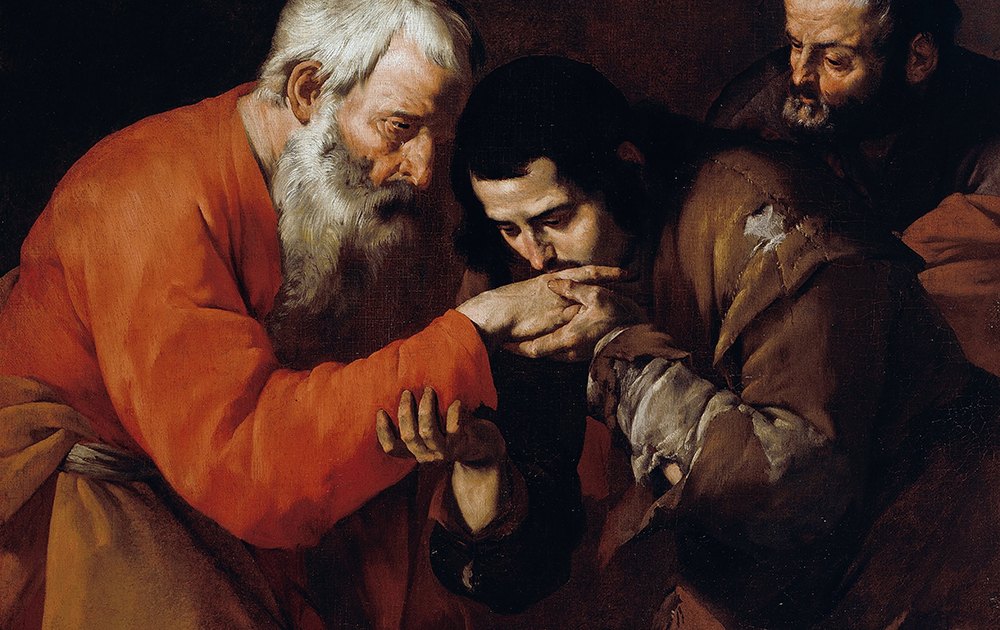
The most well-known parable of Jesus is “The Prodigal Son”, or so it is commonly called. It is the parable found in the latter part of Luke 15. This chapter has probably been preached more than almost any other chapter in history. It certainly ranks in the top 10. I am sure that many, many people owe their souls to a presentation they heard on this timeless story. In many ways, Jesus hit all the best notes when he crafted this amazing tale of rebellion, descent, death, repentance, resurrection, and restoration. Every Christian parent who has had a “prodigal son” finds tremendous hope in the tender consideration that Jesus gives their situation. But for all that, there is a nagging problem: The point of this parable is not the “prodigal son”.
I am not suggesting that there are no lessons to be learned from that portion of the parable, or that there is no application. All of that is present and valuable. However, if that is all we get out of it, then we have missed the point Jesus was making. And though I love a good “Prodigal Son” sermon as much as the next guy, I must insist that the actual point Jesus is driving at is more important than any application that we can make out of the details of the passage. Even sermons that deal with both brothers fully often are no closer to exegeting the text than those that emphasize only the tearjerker first act. The point of the parable, and for that matter, the point of the entire chapter is the elder brother. So if the younger son is “The Prodigal Son”, perhaps we should call the parable “The Frugal Brother”.
A common error is that “prodigal” means lost or wayward. Which is understandable, especially in modern times when that characteristic looms large on our hearts. However, as those of you who have looked up the word know, “prodigal” means wasteful, spendthrift, reckless, or irresponsible. In other words, the opposite of frugal. This illustrates how much our modern perspective differs from that of our ancestors. They viewed the noteworthy facet of the younger son’s moral turpitude to be his wanton dissipation of the father’s wealth. Whereas in modern times, we see the unhappy result of his choices as the more significant characteristic of his story. This drift towards sentimentalism has much to do with the general misunderstanding of the parable as well as the entire chapter.
To understand this passage of Scripture, we must consider the entire chapter as a single response to a very specific tension. It is common for the discussion of the lost coin and the lost sheep to be treated as parallel yet independent parables, with the climax being that of the lost son. While this appraisal isn’t bankrupt of truth, it does overlook the language of the text and dulls the brilliance of Christ’s censure. Let’s take a few moments and walk through this chapter and admire what is arguably the greatest psychological interaction in the Bible. (It is a possible tie between this and the parable of The Good Samaritan.) We will step over the most overdone details, since our interest is understanding the overall thrust and point of the passage, not performing a word for word analysis — there are many and much better such commentaries already and I recommend any of them to you for that level of analysis.
First, we should observe the occasion for this parable. Jesus is being followed by great multitudes of people primarily because of the power and grace of his words. In that throng are a good many publicans and prostitutes, who’s only apparent interest in Jesus is to hear his words. There seems to be a very consistent witness by all the Evangelists that these lowest of low sinners were the least self-interested in their craving for Christ, insofar as wanting bread, or healing, or some other favor. And Jesus, as all the Gospels portray as being His typical behavior, paid them special attention. So much so that he often ignored the religious leaders all together. Christ had already notified them that his focus on the sinners and neglect of the just was deliberate, and he cautioned the religious leaders that they should go and learn what the Scriptures meant: “I will have mercy and not sacrifice”. However, the Pharisees and Scribes saw themselves as his equals, as they demonstrated when Jesus occasionally did accept their invitation to dinner, and they did not wash his feet or even offer him water to do it himself — in that culture, a clear signal that they saw themselves as equals, or better. So for Jesus to ignore them and their “deep” theological and philosophical discussions and focus his attention on the most ignorant and base people imaginable was inconceivable and infuriating. In their fury they vacillated between assuming Jesus simply was naively oblivious of the kind of scum these sinners were, to concluding that he was an unprincipled, self-serving populist, gathering a following catch as catch can.
Adding to the dramatic tension of the occasion is the undisputed fact that the Pharisees were mostly right. The publicans and prostitutes really were that bad. They were traitors and they had recklessly taken the portion of goods that fell to them and wasted it living among the filthiest of Gentiles. The prostitutes slept with the Roman oppressors and the publicans did their dirty work using their privileged knowledge of their neighbours to squeeze them dry. It is difficult to even imagine a more despicable and sordid lot than the throng that Jesus was setting with, eating with, and chatting with. Whatever rebuke he might be directing to them didn’t seem sufficient, and it didn’t seem that he was doing much rebuking anyway. So they stewed and they murmured; and Jesus caught wind of it. And so he speaks a parable to them.
Here is where we need to recognize that the Gospels are written with non-linear story lines. It is very common for them to advance the narrative as a series of parallel mini-narratives, pushing one ahead, and then another past it, and then another, and then returning to a previous storyline and pushing it ahead. A sort of literary backgammon, if you will. This can be seen clearly in John 13, for instance; and that is what goes on here as well. Luke has set up the background elements of the story and then gives that portion of the story a shove. He then steps back and records how Jesus prepares them to receive the parable he is about to tell them. Jesus wants them to feel the maximum effect of the upcoming parable. His strategy for that is to first publicly establish a baseline of behavior. How do they typically act in situations that are analogous to the one he is going to lay out in the parable? He wants them to say for the record how they would normally respond and react to two very common scenarios: Loosing a sheep from their flock and loosing a coin from their purse. These two scenarios he confronts them with are not parables, not in any meaningful sense anyway, and they are certainly not the parable that Luke just mentioned as forthcoming. Trying to find too much spiritual application in these ‘control questions’ is fraught with problems, regardless of how creative preachers have managed to wrangle them into gospel sermons and hymns. The shepherd in the first ‘control question’ is not the Good Shepherd, nor is it indicative of how the Good Shepherd tends to the hundred or deals with the one. And the woman of the second ‘control question’ is not the Good… uhh… Banker, either. As Jesus asks them, How would any man and woman of you act in this situation? Jesus wants the Pharisees and Scribes, as well as all the audience, to go on the record with how they would respond to losing a single sheep and a single coin. And, even more importantly, how they would react if one of their neighbours had lost a single sheep or coin and then recovered it. We should note that Jesus graciously tips his hand at the end of each of these ‘control questions’; it isn’t blatant entrapment. Had Jesus ended his rebuke there it would have been compelling, but that was only the setup, or in magician lingo, that was ‘The Pledge’, with ‘The Turn’ coming up and ‘The Prestige’ fast on its heels.
Once Luke has worked through the setup, he now returns to the main narrative that he had shoved forward previously. He writes: “And he said”. This type of expression is critical in the Biblical text. In a time when punctuation didn’t exist, they had to use words to convey the structure. One very common verbal punctuation is repeating a keyword or phrase after a parenthetical passage. In this case he repeats the last word before the ‘control questions’ (“saying”) to communicate to the reader that we are now back on the original storyline. So, having nailed down the baseline behavior of his audience, he proceeds to tell them the parable.
The parable itself you are all certainly very familiar with, and if you aren’t then open a Bible and read Luke 15, it really is a fantastic story! While obvious, It is very important to note that it is a story of two sons. So much of this story is intentionally composed to mirror, in shocking and fascinating ways, the stories of the Old Testament. Stories like Cain and Abel and Jacob and Esau for instance. But Jesus is using a sort of funhouse mirror, where everything is going to be turned on its head and twisted all around. He is purposely throwing them off kilter — just as he does in The Good Samaritan, by the way. If you were to have done a pre-show interview with the audience and asked them who they most identified with in any story of two sons and a father: The elder or the younger? They would say to a man: The younger! They identified with Abel, Jacob, David, and Solomon; all younger brothers. Not Cain, Esau, Eliab, and Adonijah. But here it is the younger son that is riotous and profane. Huge plot twist! It doesn’t require an advanced degree in literature to ferret out the parallel that Jesus is drawing here. The younger son is the publicans and prostitutes. And Jesus is affirming that they are indeed wicked, lost souls. He doesn’t sugarcoat their sins. They have squandered God’s inheritance. They have descended to the lowest depths of depravity. They have resorted to the most disgusting choices to sustain their rebellion. However, they have also come to themselves, recognized their desperate condition, and have slogged up out of the manure and back home towards the Father, and they have truly repented of their awful rebellion, and are willing to do whatever necessary to restitute what they dissipated.
Following the treatment of the younger son we are shown the father’s shocking response. Full of grace and love and forgiveness. No restitution demanded or accepted. Immediate reconciliation and restoration into the family. Immediate imputation of righteousness and sanctification in the robes and signet of the Father. This portion is the detailed and vivid imagery of the previous gracious hints at the close of both ‘control questions’: That for every sinner that repents there is great joy in the presence of the angels of God.
That is The Turn. If Jesus had concluded the parable with the joy of the father it would have been perfect; we wouldn’t have known any better to expect any more. But now he is going to make it more exceedingly perfect. Now comes The Prestige.
Enter the elder son. The good son. The faithful son. The obedient son. The virtuous son. The hardworking son. The conscientious son. The frugal brother.
He hears the commotion, he comes in from working late in the field, he finds a servant and demands to know what all the fuss is about. Your brother is back! Your father is throwing a party! All the neighbours are celebrating! The elder brother becomes very angry and refuses to participate in the celebrations. The father comes out and entreats him, begs him, stretches forth his hands to him, tries to gather him as hen gathers her chickens, but he would not. Now this point is critical: He is not angry because of the expense of the party. He is not angry because he never got a party of his own. He is filled with righteous indignation for the way the younger son has treated the father and he is angry and resentful because of the the relative attention the father has given to the younger son in comparison to himself. It is the unfairness of the father that he despises. He shares the same indignation as the laborers of the vineyard parable who had worked the entire day but were paid the same as those that worked only one hour. He believes that the father should respond to both sons more equitably, in accordance with the corresponding years of faithfulness and obedience that each has rendered to the father. It is untoward that a prodigal son should be celebrated more jubilantly than a frugal son. The elder son obviously represents the Pharisees and Scribes, in all their self-righteous glory. After centuries of delighting in seeing themselves as being the preferred younger son of every story, they were getting a small taste of what it was like to be Cain and Esau. To not be preferred, and to not be able to explain why. The bitter unfairness of it. The seemingly capriciousness of God’s favor.
And then… nothing. The story ends abruptly. But that isn’t The Prestige. The conclusion of the story was already told. The elder son wrote his own ending at the beginning. When Jesus asked him how he would treat a lost sheep and a lost coin. The genius of Jesus is that he turned the introduction into the conclusion, the setup into the payoff, the Pledge into the Prestige. It is sublime! The point of the parable crashes down on the audience. They all at once realize that they are the elder son who not only refuses to rejoice over his found brother, but also refuses to so much as sympathize with the joy of the father over his found son. But what cuts to the quick is realizing that they had already betrayed their inhumanity. They had boasted that they would go to the ends of the world to save a sheep and find a coin, and they would party all night with anyone who had found a lost sheep or coin. But they wouldn’t rejoice with their own Father over the soul of their own brother. They had indicted and sentenced themselves for loving sheep and coins more than the souls of their own brethren. Now they understood Cain’s fallen countenance and Esau’s bitter weeping. But could they pull back in time? Before they also instantiated Cain’s explosive anger and Esau’s unforgivable profanity? How does the story end? Will the elder son also repent and share in the eternal joy of the Father? Or will he harden his merciless heart and flee into the outer darkness, cursing the Father and plotting against his Son?
M. N. Jackson is a founding elder and teaching pastor of Free Born Church. He was a missionary in Mexico for over 20 years where he was part of a team of church planters. After being deported from Mexico for preaching the gospel, he returned to San Antonio, and continued ministering the word.


